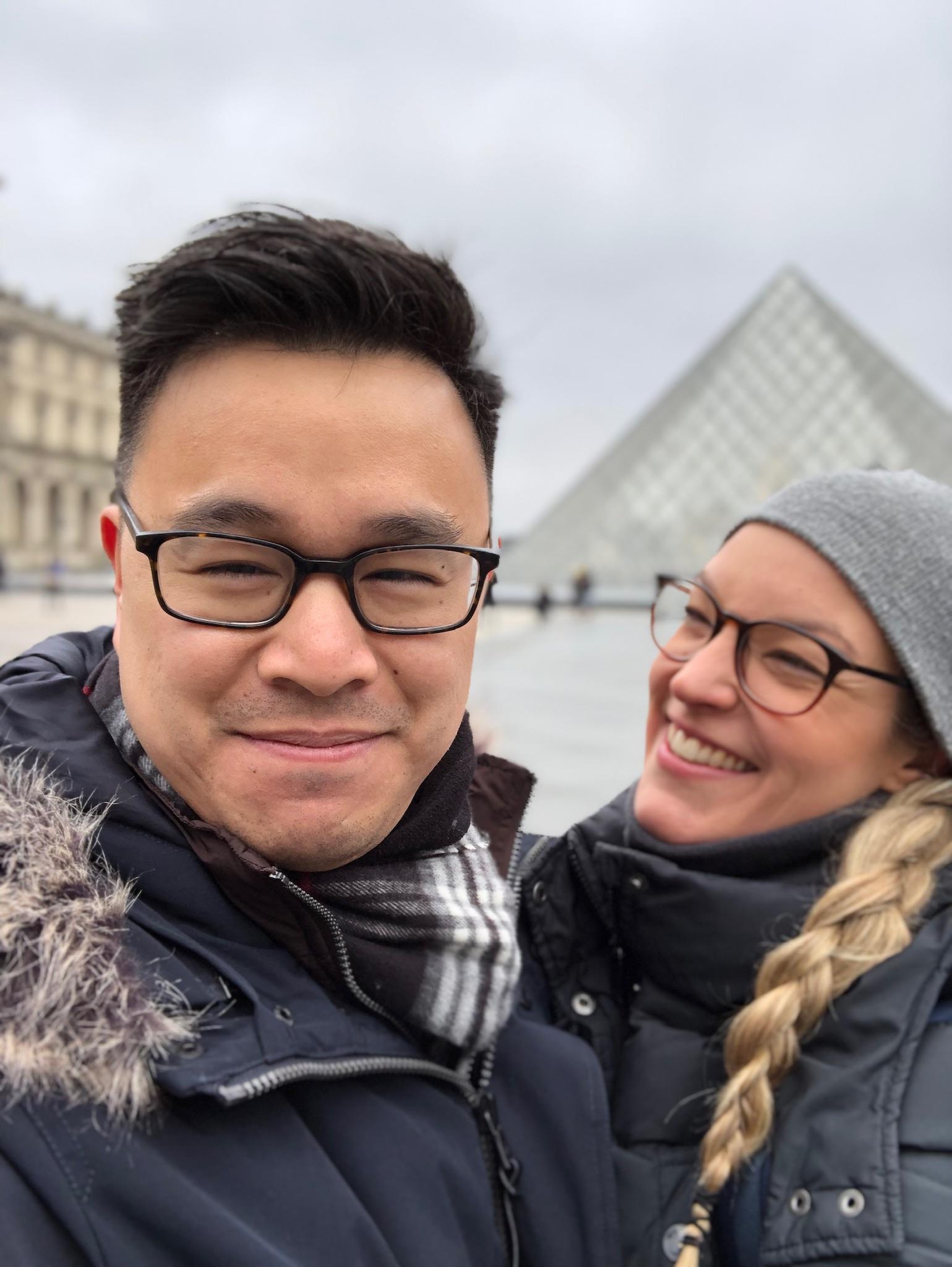Brittney & Alexander
FAQs

Question
What are France's COVID Entry Requirements?
Answer
As of summer 2022, all vaccinated travelers from the United States are free to enter into France with vaccination card, and are not required to take a test prior of entry. You may find out more at: https://www.diplomatie.gouv.fr/en/coming-to-france/coming-to-france-your-covid-19-questions-answered/
Question
When should I arrive to Paris?
Answer
We encourage everyone to arrive a few days before the wedding to recover from jet lag.
Question
Where should I stay in Paris?
Answer
You are free to stay wherever you are most comfortable, but we have a selection of two recommended hotels for you. Please see the Travel Page for more details.
Question
What time is the wedding dinner?
Answer
9:00pm! The French eat late so make sure to enjoy a late lunch before the wedding. Le déjeuner est très important á Paris!
Question
May I make any special requests if I have food allergies or dietary restrictions?
Answer
Yes! Please let us know when you RSVP. Everyone will be accommodated.
Question
Is there a dress code?
Answer
Yes. The dress code for the wedding is Black-tie Optional - dark suits and ties (bowties accepted as well), midi/long dresses or jumpers. Wedding party will be dressed in tuxedos and long black dresses. The dress code for the Welcome Cruise Event is cocktail attire. Think Parisian chic.
Question
Are children invited to the wedding?
Answer
Officially, if you have children then we encourage you to bring them along to Paris; but we respectively request to not bring your children to the wedding. However, they are invited to the Bon Voyage picnic!
Question
What is July weather like in Paris?
Answer
Usually, summer in Paris in July is nice, with temperatures around 75° Fahrenheit/24° Celsius.
Question
How will I be able to keep in touch with you when we're in Paris? I won't have phone service.
Answer
We will set up a group chat through WhatsApp - a free, messenger app available on all mobile smart devices - where everyone can stay connected to one another by simply connecting to wifi.
Question
Where can I find the best view of Paris?
Answer
While the Eiffel Tower is a beautiful and ionic place to be, no view of the entire city is better than the sweeping, panoramic city skyline from La Basilique du Sacré Cœur. I guarantee you will not regret it.
Question
What are some helpful tips for my stay in France?
Answer
1. France operates on the 24-hour clock, so when you ask "il est quelle heure?", expect military time after 12 noon or "midi". 2. You are required to return your room key to the Front Desk every time you leave the hotel. You will be given your key once more on you return. This is customary in most hotels in Europe. 3. When out dining, tip is already included in the total amount of the bill. 4. Some King size beds are actually just two double beds pushed together under the sheets. This is common in European hotels. 5. The Eiffel Tower lights up and demonstrates a sparkling light show on top of the hour, every hour, from sundown to 1 AM. It lasts for 5 minutes. 6. Do you want to see the famous Mona Lisa in the Louvre? Go early when the museum opens. Usually, anytime before 11 AM, you will be able to walk up to the railing and get a clear, close view of the beautiful, historical painting. Once noon hits, you will be waiting up to 45 minutes to a hour of wait time.
Question
What is breakfast, lunch, and dinner like in Paris?
Answer
Le petit-dejeuner (breakfast) is the smallest, least important meal of the day. This "on-the-go" meal usually consists of un café, un croissant, or une pâtisserie. Le dejeuner (lunch) is considered the longest and most important meal of the day, which usually runs for two hours. Here, you can have whatever full plate you would like, as long as it comes with "un verre du vin" (a glass of wine). It is also customary to bring une baguette if attending a lunch-in. Yes... you will see everyone carrying a baguette. Le dîner is usually later into the night, right after the French spend an hour drinking with their friends after work. Expect the crowd to shrink sometime after 8 PM, or "dix-huit heures".
Question
What are some basic French greetings?
Answer
Bonjour - "Good morning/Hello". A formal greeting in the day. Always used to start a conversation with anyone. Bonsoir - "Good evening". A formal greeting at night. Salut - "Hello/hi". An informal way to greet a friend or someone you know. Can be used for "bye". Au revoir - "Goodbye" Bonne journée - "Have a good day" Bonne soirée - "Have a good evening" Bonne nuit - "Good night" It is usually considered polite to follow your greeting and or question to a stranger with "Monsieur" or "Madam".
Question
What are some helpful French sayings?
Answer
Most Parisians are usually willing to help you in English if you first attempt to speak French. Here are some easy questions you may ask to navigate your way through "les rues de Paris": Parlez-vous anglais? (parh-lay voo awn-glay) - The formal way to ask "do you speak English?" Où sont les toilettes? (Oo sont lay twa-let) - Where is the restroom? Je suis désolée (je swee des-oh-lay) - I am sorry. Je ne parle pas français (je ne parl pah frawn-say) - I don't speak French. Excusez moi (ex-cue-zay mwah) - Excuse me C'est combien? (Sey com-bee-uh) - How much is it? Pardon, pouvez-vous m’aider? (Par-doh, poo-vay voo mayday) - Pardon, can you help me? Une table pour deux personnes (Oon tab-le pour duh person) - A table for two people. And as always, ending any requests with "s'il vous plaît" (please) goes a long way.